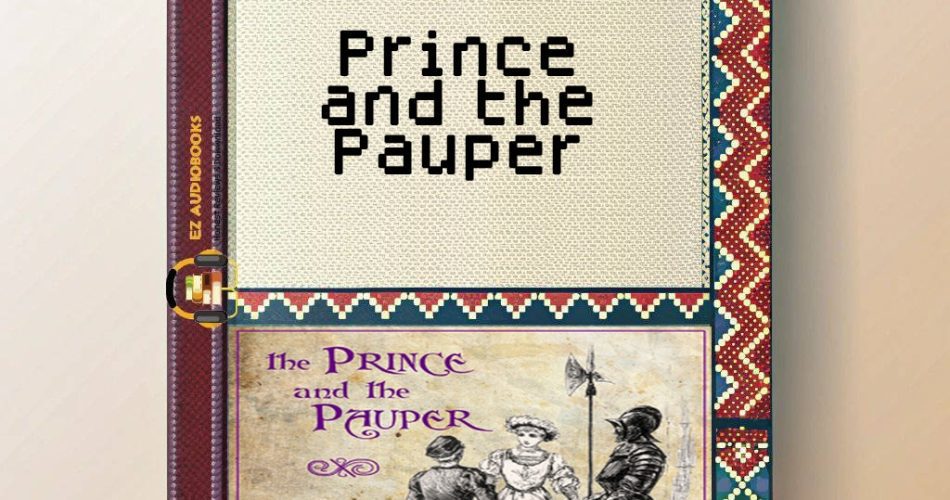Audiobook Sample
Listen to the sample to experience the story.
Please wait while we verify your browser...
- Title: Prince and the Pauper
- Author: Mark Twain
- Narrator: John Greenman
- Length: 06:56:00
- Version: Abridged
- Release Date: 01/01/2016
- Publisher: LibriVox
- Genre: Kids, Fairy Tales & Folklore, Classics
- ISBN13: SABLIB9783155
Here’s what makes this interesting: Mark Twain’s “The Prince and the Pauper”, a classic tale of mistaken identities and biting social satire, gets a fresh spin in this free audiobook narrated by John Greenman, courtesy of LibriVox. As someone who’s spent years dissecting digital storytelling – whether it’s for my ‘Future of Stories’ podcast or my BookTok deep dives – I couldn’t wait to sink into this one. Set in 1547 Tudor England, the novel swaps the lives of Tom Canty, a scrappy pauper, and Prince Edward, heir to Henry VIII’s throne, and lets the chaos unfold. What starts as a whimsical premise quickly becomes a razor-sharp commentary on class, power, and identity. And honestly? Listening to it feels like Twain himself is whispering cultural critiques in your ear, remixed for today’s audience.
Let’s break this down: I’ve always been fascinated by how audio can transform a story – think back to my podcast episode on “Project Hail Mary”, where I geeked out over how sound design brought alien languages to life. With “The Prince and the Pauper”, I was curious if Greenman’s narration could carry the weight of Twain’s shift from his usual Midwestern snark to a Dickensian flair. Spoiler: it does, and then some. The moment I hit play, I was transported to Offal Court, the grimy London slum where Tom dreams of something bigger. It reminded me of my own childhood, sprawled on my bedroom floor with a beat-up library copy of “Oliver Twist”, imagining I could swap places with someone grander. That personal memory hit hard as I listened – there’s something universal about wanting to step into someone else’s shoes, and Twain nails it.
The story’s heart lies in its themes: the absurdity of class divides, the fluidity of identity, and the way fate toys with us all. Tom, thrust into the royal court, fumbles through etiquette with a mix of panic and surprising savvy, while Edward grapples with the brutal realities of poverty. The cultural impact here is undeniable – it’s social satire with a fairy-tale twist, perfect for kids and adults alike. Twain’s critique of Tudor inequality feels eerily relevant today, like a 16th-century TikTok rant about privilege gone viral. And Greenman’s narration? It’s the secret sauce. His voice dances between Tom’s wide-eyed wonder and Edward’s regal confusion, layering humor and heart into every chapter. The audio quality, crisp and clear despite being a free LibriVox production, makes this listening experience a steal – seriously, why isn’t everyone talking about this on BookTok yet?
Now, let’s talk performance. Greenman doesn’t just read – he “performs”. His pacing keeps the 10-hour runtime (that’s roughly 0.29 days in audiobook speak) breezing by, and his character voices are distinct without veering into caricature. When Tom tries to navigate courtly life, Greenman’s hesitant tone mirrors the boy’s nerves; when Edward faces the pauper’s world, there’s a subtle shift to indignation that’s pure prince. It’s not a multi-voice drama like some modern audiobooks I’ve raved about, but it doesn’t need to be – Greenman carries it solo with finesse. That said, I’ll admit the lack of ambient sound effects left me wanting a bit more immersion. Imagine creaking castle doors or the clamor of London streets – my audio production side geeked out dreaming up what could’ve been.
Strengths? Plenty. The audiobook experience amplifies Twain’s humor – those moments where Tom accidentally insults a noble or Edward gets a crash course in survival hit harder when you hear the delivery. It’s a classic that feels fresh, blending fairy-tale charm with a critique that could headline a modern podcast. And it’s free! LibriVox delivers this gem at zero cost, making it a no-brainer for anyone into kids’ classics or folklore vibes. But limitations exist too. If you’re not a fan of single-narrator reads, you might miss the dynamic energy of a full cast. And while Greenman’s solid, he’s no celebrity voice – don’t expect the star power of, say, a Neil Gaiman narration.
How does it stack up? Think “Oliver Twist” meets “A Connecticut Yankee in King Arthur’s Court”. Like Dickens, Twain paints a vivid picture of societal rot; like his own later work, he plays with identity in a way that’s downright meta. I kept flashing back to my BookTok breakdown of “The Seven Husbands of Evelyn Hugo”, where fans raved about how narration unlocked new layers. Greenman does that here – Tom’s wisdom and Edward’s growth shine brighter through his voice than they did when I first read the book in print.
Who’s this for? Kids who love a good adventure, sure, but also anyone who geeks out over satire or historical fiction. If you’re a parent looking for a free audiobook to spark discussions about fairness – or a BookTokker hunting for your next obsession – this is it. I’d even recommend it to my MIT crew studying digital narratives; it’s a masterclass in adapting timeless stories for new formats.
Reflecting on this, I’m struck by how much the audiobook medium adds to Twain’s vision. It’s not just a story – it’s a conversation across centuries, brought to life by Greenman’s voice and my own nostalgia. I can already picture the TikTok edits: ‘POV: You’re a pauper turned prince, but the imposter syndrome is real.’ Maybe I’ll start that trend myself.
Until our next digital story dive, keep listening and dreaming big, Sophie Bennett

